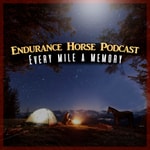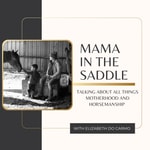Train Your Own Horse with Stacy Westfall – Détails, épisodes et analyse
Détails du podcast
Informations techniques et générales issues du flux RSS du podcast.

Train Your Own Horse with Stacy Westfall
Stacy Westfall
Fréquence : 1 épisode/7j. Total Éps: 349

Classements récents
Dernières positions dans les classements Apple Podcasts et Spotify.
Apple Podcasts
🇨🇦 Canada - wilderness
05/08/2025#94🇬🇧 Grande Bretagne - wilderness
05/08/2025#86🇨🇦 Canada - wilderness
04/08/2025#98🇬🇧 Grande Bretagne - wilderness
04/08/2025#63🇨🇦 Canada - wilderness
03/08/2025#86🇬🇧 Grande Bretagne - wilderness
03/08/2025#39🇨🇦 Canada - wilderness
02/08/2025#68🇬🇧 Grande Bretagne - wilderness
02/08/2025#59🇨🇦 Canada - wilderness
01/08/2025#22🇬🇧 Grande Bretagne - wilderness
01/08/2025#48
Spotify
Aucun classement récent disponible
Liens partagés entre épisodes et podcasts
Liens présents dans les descriptions d'épisodes et autres podcasts les utilisant également.
See all- https://stacywestfall.com/live/
40 partages
- https://equithrive.com/
12 partages
- https://www.tnequinehospital.com/
6 partages
Qualité et score du flux RSS
Évaluation technique de la qualité et de la structure du flux RSS.
See allScore global : 63%
Historique des publications
Répartition mensuelle des publications d'épisodes au fil des années.
Episode 302: Words Matter: How Language Shapes Your Equestrian Experience
Saison 24 · Épisode 302
mercredi 28 août 2024 • Durée 33:13
Stacy Westfall discusses the overuse of the phrase "I'm sorry" in everyday situations and how it relates to horsemanship. She recounts observing excessive apologizing in a workshop setting and at grocery stores, questioning whether these apologies are genuine expressions of remorse or habitual responses. Westfall emphasizes the importance of understanding one's emotional defaults and how they impact interactions with horses.
She encourages riders to examine why they apologize during lessons or while sharing arena space, suggesting that many of these apologies are unnecessary and may stem from misplaced feelings of inadequacy. Westfall advocates for clearer communication and understanding of riding etiquette to reduce the need for constant apologies.
The podcast also touches on the emotions involved in buying and selling horses, prompting listeners to reflect on their initial emotional responses to these situations.
Episode 301: Indecisive No More: Conquering Decision Fatigue, and Miserable Maybes
Saison 24 · Épisode 301
mercredi 21 août 2024 • Durée 28:27
This episode of the podcast explores the concept of "decision fatigue" and the challenges of navigating the "messy middle" or "miserable maybe" when faced with big life decisions. Stacy shares how this process can be similar to what a horse expereinces when being trained to approach and relax around scary objects.
Key takeaways:
- Decision fatigue is similar to physical fatigue - making too many decisions can mentally "overwork" the brain
- The period between first considering a decision and actually making it is rife with potential for decision fatigue
- Setting boundaries and dedicated "decision-making time" can help manage this process
Overall, this episode provides practical strategies for handling the challenge of big, complex decisions and avoiding the mental strain that can come with prolonged indecision.
Episode 292: You are Invited: Two Invitations Horses Offer Riders
Saison 23 · Épisode 292
mercredi 19 juin 2024 • Durée 14:58
In this podcast episode, Stacy Westfall introduces the concept of viewing a horse's behavior as an "invitation" that riders can choose to accept or decline. She explains that horses often present two types of invitations to riders:
- Emotional invitations: When a horse becomes anxious, jumpy, or displays a particular emotional state, it can be seen as an invitation for the rider to join that emotional state.
- Training invitations: Horses may also invite riders to use certain aids or respond in specific ways during training or riding. For example, a lazy horse might invite the rider to do more work to maintain energy, while a hot horse might invite the rider to constantly apply the brakes.
Stacy encourages riders to:
- Recognize these invitations from their horses
- Become aware of their default responses to these invitations
- Consider choosing a different, more productive response
- Look for invitations during their next 10 rides
- Aim to break habitual patterns by responding intentionally to their horse's cues.
Episode 202: 3 things to do when the next step ISN’T obvious
Saison 16 · Épisode 202
mercredi 28 septembre 2022 • Durée 17:21
Episode 201: The next most obvious step.
Saison 16 · Épisode 201
mercredi 21 septembre 2022 • Durée 13:52
I recorded this audio while riding Willow bridleless; day 2.
My point: I didn’t set out to ride Willow bridleless, as in, the thought was NOWHERE in my mind.
Yet, we arrived here.
Looking back at our journey, you could say we took many detours…or you could say that I consistently took the next most obvious step.
Consider what would happen if you took these two steps, over and over and over again:
1- remember why you are doing this. What was your dream-goal?
2-take committed action.
Sometimes the next, most obvious step…really is the best choice.
Podcast 200: Can you relate to any of these struggles or success stories?
Saison 16 · Épisode 200
mercredi 14 septembre 2022 • Durée 27:58
200 episodes and over 1,000,000 downloads later…its working!
200 episodes and over 1,000,000 downloads later…
When I started this podcast, I wanted to help riders understand their horses, so they could create clear, confident, communication…and it’s working!
To celebrate reaching these milestones, I’m sharing my student success stories. These moments are glimpses into the process of gaining clarity through understanding. You can hear both the struggle and the breakthrough, as well as the enjoyment and the success.
Thanks for listening!
Episode 199: The trickiest concept
Saison 16 · Épisode 199
mercredi 7 septembre 2022 • Durée 15:39
The trickiest concept of them all…If the horse gives the ‘incorrect’ answer…it doesn’t necessarily mean you taught the lesson wrong.
This one can make you crazy…
Or it can make you micromanage…
Or it can tempt you to force things to happen…
The challenge is that in teaching the horse…we are always getting feedback from them, but if they give the ‘incorrect’ answer…it doesn’t necessarily mean you taught the lesson wrong.
If the horse questions you…and you think his feedback means you’re doing it wrong…you might change what you're doing…even though the horse was just asking if some previous answer could apply here...or was offering something creative...or was asking for clarification.
Episode 198: The benefits of NOT believing you can.
Saison 16 · Épisode 198
mercredi 31 août 2022 • Durée 26:31
What stands in the way of reaching your dream?
The ability to hold belief for the amount of time it takes to achieve it.
But…
If it's as simple as believing…why don’t we just believe?
There are many hidden benefits to NOT believing.
It conserves energy, allows you to stay where you are, and lets you experience less of the uncomfortable emotions that often come with trying new things.
But…
What if you ARE capable?
What if you can do it if you just keep going?
Learning to hold space for belief is a skill you can learn.
I’ll explain more in the podcast.
Episode 197: The delayed side effects of your habit patterns: desirable or undesirable?
Saison 16 · Épisode 197
mercredi 24 août 2022 • Durée 29:21
Episode 196: Teaching, Testing and Micromanaging: The difference is timing
Saison 16 · Épisode 196
mercredi 17 août 2022 • Durée 28:20
The difference between testing, training, and micromanaging is TIMING.
If you are not sure of the difference in timing there, is a much higher chance that you will be frequently ‘correcting’ mistakes, or you’ll find yourself trying to prevent mistakes.
There is a way to train your horse that feels like guiding instead of ‘correcting’. In this podcast, I share how you can set your horse up for success, stop micromanaging and ‘test’ when you are confident the horse knows the answer.

